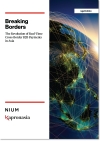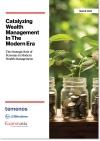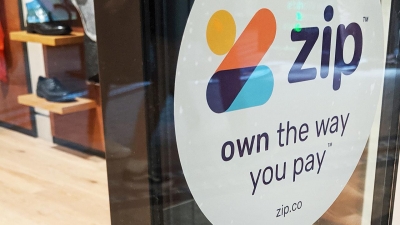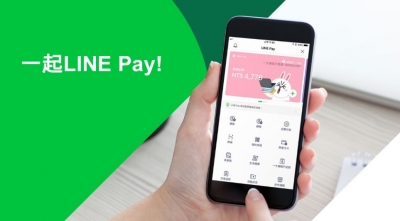Latest Insight
- Why an expected APAC fintech consolidation wave has yet to come
- Why cash is still prevalent in Asia
- Japan steps up green finance efforts
- South Korea charts middle path on crypto
- Should Grab and GoTo merge?
- Singapore pushes ahead with fintech-driven sustainability
- Digital banks in South Korea continue to thrive
- Billease is the rare profitable BNPL firm
- Fintech sector in Pakistan faces mounting challenges
- Where digital banks in Asia can make a difference
Latest Reports
-
Breaking Borders
 Despite progress in payment systems, the absence of a unified, cross-border Real-Time Payments (RTP) network means that intermediaries play a crucial role in facilitating connectivity. This report examines the ongoing complexities, challenges, and initiatives in creating a seamless payment landscape across Asia. Innovate to Elevate
Despite progress in payment systems, the absence of a unified, cross-border Real-Time Payments (RTP) network means that intermediaries play a crucial role in facilitating connectivity. This report examines the ongoing complexities, challenges, and initiatives in creating a seamless payment landscape across Asia. Innovate to Elevate In the dynamic and diverse financial landscape of the Asia-Pacific (APAC) region, banks are at a pivotal juncture, facing the twin imperatives of innovation and resilience to meet evolving consumer expectations and navigate digital disruption. Catalyzing Wealth Management In The Modern Era
In the dynamic and diverse financial landscape of the Asia-Pacific (APAC) region, banks are at a pivotal juncture, facing the twin imperatives of innovation and resilience to meet evolving consumer expectations and navigate digital disruption. Catalyzing Wealth Management In The Modern Era Hyper-personalized wealth management presents a paradigm shift from traditional models relying on static, generalized segments. Developing tailored investor personas based on psychographics, behaviours and fluid financial goals enables financial institutions to deliver rich and tailored customer experiences that resonate with next-generation priorities.
Hyper-personalized wealth management presents a paradigm shift from traditional models relying on static, generalized segments. Developing tailored investor personas based on psychographics, behaviours and fluid financial goals enables financial institutions to deliver rich and tailored customer experiences that resonate with next-generation priorities.
Events
| October 21, 2024 - October 24, 2024 Sibos Beijing |
| November 06, 2024 - November 08, 2024 Singapore Fintech Festival |
Zip has been one of the biggest Australian buy now pay later (BNPL) success stories, second only to Afterpay. Zip, Afterpay and others have been so successful that other financial firms are hopping on the BNPL bandwagon, from PayPal to incumbent lenders like Commonwealth Bank. As the market grows more crowded and restrictive regulations loom, Zip is looking to expand overseas, including Canada, Europe and Southeast Asia.
South Korea’s digital banks are on a roll, buoyed by robust demand for digital financial services amid the pandemic. South Korea went cashless long ago with credit cards, but since the pandemic hit in early 2020, mobile banking has taken off. As a result, Kakao Bank, K bank and Toss have grown exponentially. All three of South Korea’s digital banks are on track for IPOs in the next two years, with Kakao likely to go public first.
It was only a matter of time before bitcoin mining landed in China’s crosshairs. Beijing identified decentralized digital currency as a systemic financial risk in 2017 – for its use in skirting capital controls and links to money laundering - and promptly hobbled key parts of the crypto ecosystem, shutting down all exchanges and banning initial coin offerings. Mining does not pose the same immediate risks to the Chinese financial system, but its enormous power usage could crimp Beijing’s efforts to curb its carbon emissions – a major central government policy objective. With that in mind, the prospects for bitcoin miners in China look dim indeed.
The hype about China's digital yuan can obscure the reality, especially in the cross-border space. The most adamant supporters of China’s CBDC argue that it poses a challenge to the US dollar’s role as the world’s dominant international currency because, well, it is digital, has a technological edge and thus will perhaps redefine global payments rails. This argument exaggerates the benefits of digitization while overlooking the fundamentals of the dollar's paramountcy.
Long lauded for its outstanding pandemic control, and accustomed to no community transmission, Taiwan is now fighting a truculent coronavirus outbreak that is averaging about 300 cases a day. As a result, Taiwan is in a quasi-lockdown state for the first time since the pandemic began. With the government telling people to stay inside and avoid face-to-face contact, this could be a turning point for cashless payments in Taiwan.
U.S.-China financial decoupling is an odd thing. Instead of a linear progression in which Chinese firms gradually eschew going public in the US and delist from its stock exchanges, we see some Chinese companies continuing to seek exits on the Nasdaq or NYSE, while others are seeking secondary listings in Hong Kong as a hedge against forced delisting. Still others are actually being forced to delist like the telecoms giant China Mobile, which is now looking at a new listing on the Shanghai Stock Exchange.
It never felt so good to lose US$422 million. Just ask Sea Group. Southeast Asia’s most valuable listed company indeed went deeper into the red in the first quarter, but its revenue also grew 147% year-on-year to US$1.76 billion. Investors like what they see. Sea’s stock price has risen almost threefold to US$246 from roughly US$83 a year ago.
Australian regulators are stepping up the fight against financial crime after issuing a staggering US$921.59 million in fines in 2020. Disciplinary action against Westpac for serious breaches of Australia’s AML/CFT act accounted for US$920.7 million of that total.In the Asia-Pacific region, only Malaysia issued more fines than Australia in 2020, and that was because of the 1MDB scandal.
Singapore’s largest lenders have started the year off on a cracking note. First DBS reported record earnings and now OCBC has done the same. The city-state’s second largest bank posted a net profit of S$1.5 billion in the January to March period, compared to S$698 million during the same period a year earlier and well exceeding Refinitiv’s estimate of S$1.08 billion.
Taiwan’s two top e-wallets, Jkopay and Line Pay, have grown exponentially in terms of transaction volume in recent years yet have failed to turn a profit. Data compiled by Taiwan’s Chinese-language Business Next show that Jkopay lost about NT$346 million, slightly less than the NT$347 million in losses a year earlier. Line Pay likely lost NT$424 million in 2020, up nearly 70% year-on-year.
More...
Ride-hailing giant Gojek is stepping up its super app play with new fundraising and the purchase of a stake in Indonesian conglomerate Lippo’s retail unit, MPPA. Earlier in May, Indonesian celluar operator Telkomsel, a subsidiary of state-owned communications giant PT Telkom Indonesia, said it would invest an additional US$300 million in Gojek. Shortly thereafter, a filing on the Indonesian Stock Exchange revealed that Gojek paid 144.85 billion rupiah (US$10.2 million) for a 4.76% stake in MPPA.
South Korea only has a handful of prominent fintechs, but they are still managing to give incumbents a bank a run for their money when it comes to online banking services. Chief among them is Kakao Bank, with 14.1 million users (more than ¼ of South Korea’s population) as well as K bank and Viva Republica’s Toss, which will launch a digital bank later this year. With the rising popularity of digital banking, South Korea’s traditional lenders are mulling launching neobanks of their own.
2021 is shaping up to be a pretty good year for DBS. Southeast Asia’s largest bank posted record earnings of US$1.52 billion in the January-March period, up 72% year-on-year. DBS generated record fee income in the first quarter, with especially strong growth in wealth management and transaction services, both of which hit new highs. DBS is not resting on its laurels though and plans to boost both its digital capabilities and international footprint.
Singapore and Thailand have made cross-border payments history with the linkage of their respective real-time retail payment systems, PayNow and PromptPay. The linkage is the first of its kind in not just Asia but the world and comes after several years of close collaboration between the Monetary Authority of Singapore (MAS) and Bank of Thailand (BoT).
Indian payments unicorn Razorpay has grown exponentially during the pandemic as the subcontinent accelerates its transition to online shopping and digital finance. In the six months since it hit unicorn status, Razorpay has seen its valuation treble to US$3 billion. The Bangalore-based firm will use the US$160 million it raised in its latest fundraising round – in which Sequoia Capital India and Singapore’s sovereign fund GIC Pte participated – to fund expansion in Southeast Asia and develop new product lines. With this latest round of funding, Razorpay has raised US$366.5 million.















